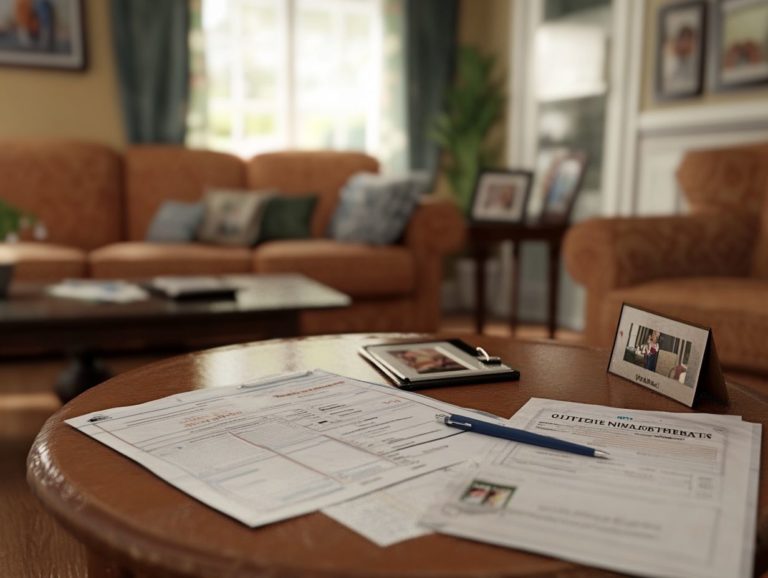How to Cancel Your Home Insurance Policy?
Canceling your home insurance policy may seem intimidating, but understanding the process can lead to a more seamless experience.
This guide explores the reasons you might consider canceling, outlines the steps for effective cancellation, and clarifies what you need to know about potential refunds.
It also highlights important factors to think about before making your decision, including alternative options and the potential impacts on your coverage and premiums.
Whether you’re unhappy with your current policy or searching for better rates, this information will help you navigate the cancellation process with confidence.
Contents
- Key Takeaways:
- Understanding Home Insurance Cancellation
- Steps to Cancel Your Home Insurance
- Canceling for a Refund
- Considerations Before Canceling
- Frequently Asked Questions
- What is the process for canceling my home insurance policy?
- How much notice do I need to give before canceling my policy?
- Will I receive a refund for any unused coverage?
- Can I cancel my policy mid-term?
- What happens to my coverage if I cancel my policy?
- Are there any consequences for canceling my home insurance policy?
Key Takeaways:

Know why you’re canceling your home insurance before you act. Contact your insurance provider directly and provide all necessary information when canceling your policy. Be aware of the refund policy and process, and consider alternatives or potential impacts on coverage and premiums.
Understanding Home Insurance Cancellation
Understanding home insurance cancellation is essential for homeowners navigating the complex world of insurance policies while making informed financial choices.
Home insurance protects your house and belongings. However, situations may arise that lead you to contemplate cancellation. Whether due to changes in your financial situation or dissatisfaction with your provider, understanding the details of cancellation helps protect your rights and adhere to state regulations.
Reasons for Canceling a Policy
There are various reasons you might consider canceling your home insurance policy. Changes in your financial situation or a history of claims can influence your decision.
If you’re unhappy with your current coverage, you may find that your policy doesn’t adequately protect your property and belongings.
As your needs change, make sure your insurance keeps up! Whether you need renovations or have acquired new assets, your insurance should reflect your current reality.
Changes in your property s condition, whether due to damage or normal wear and tear, can also prompt a reevaluation of your existing coverage. Each of these points highlights the fluid nature of homeownership and reinforces your right to seek insurance that meets your needs.
Steps to Cancel Your Home Insurance
To cancel your home insurance policy, follow a few essential steps for a smooth transition.
Start by reaching out to your insurance provider, ready to share necessary personal information. Prepare a written notice that clearly states your intentions and desired effective dates.
This approach aligns with the cancellation provisions in your policy, helping you navigate the process smoothly.
Contacting Your Insurance Provider

The first step in canceling your home insurance policy is to reach out to your insurance provider or agent. Ensure you have all the necessary details and a cancellation notice prepared for submission.
This initial interaction is vital as it establishes a direct line of communication to address any questions or concerns you may have regarding the cancellation process. Provide key information such as your policy number, the reason for cancellation, and any relevant dates.
Know what your insurance provider needs for cancellation. A clear written notice can make the process much smoother.
Clear communication is crucial; without it, misunderstandings or delays could occur, potentially affecting your coverage until the cancellation is officially processed.
Providing Necessary Information
When you’re ready to cancel your policy, it’s crucial to provide all the necessary personal information. This includes your claims history and details about your escrow account, which is a special account where money is held until certain conditions are met. Providing this information ensures a seamless cancellation process.
This information is key because it allows the insurance provider to verify your identity and confirm that everything is in order. This prevents any potential complications during cancellation.
Make sure to address any outstanding refund checks or payments at this stage. Overlooking this detail could lead to frustrating delays or even the loss of funds you re entitled to.
As a policyholder, take the time to double-check your statements. Maintain clear communication with your provider and keep a meticulous record of all correspondence. This diligence will help ensure that your cancellation process wraps up smoothly and without any unexpected issues.
Canceling for a Refund
Thinking of canceling your homeowners insurance? Here s what you should know! As a homeowner, you may find yourself eligible for a refund, contingent upon the insurer’s refund policy.
This policy typically considers your initial premium and the duration of the policy. Understanding the intricacies of the refund process is essential, as it allows you to ensure that any refund checks owed to you arrive promptly after your cancellation.
Refund Policy and Process
The refund policy varies among insurance companies. Therefore, understanding the cancellation process is crucial if you want to receive any refund checks after cancellation.
To begin, read the fine print of your policy to grasp the specific terms related to refunds, as these terms can differ significantly. Financial factors, such as whether you paid premiums monthly or annually, might influence the refund amount. Typically, unearned premiums are refunded upon successful cancellation.
Be aware that some insurers may withhold a certain percentage as a processing fee or to cover administrative costs. Generally, you can expect the timeline for receiving funds to range from a few days to several weeks, depending on your insurance provider s internal processes and the typical bank processing times.
Keeping documentation organized can help streamline the process and allow you to track your refunds more efficiently.
Considerations Before Canceling

Before you decide to cancel your homeowners insurance, carefully consider a few key factors.
Think about your current insurance needs, the condition of your property, and your broader financial situation. By evaluating these elements, you’ll be better equipped to make informed decisions that truly reflect your long-term goals and rights.
Alternatives to Cancelling
Instead of simply canceling your homeowners insurance policy, explore alternatives that better suit your needs while ensuring you retain essential coverage.
One option is to adjust your coverage limits. This can help strike a balance between providing sufficient protection and achieving more affordable premiums.
You could also consider switching to a different insurance policy that better aligns with your specific circumstances or offers enticing discounts for bundled services.
Engaging in negotiations with your insurance company could uncover potential savings or adjustments in coverage terms that you may not have initially considered.
By taking these proactive steps, you can craft a tailored policy that effectively addresses your financial situation and provides you with peace of mind.
Impact on Coverage and Premiums
Canceling a homeowners insurance policy can have a notable impact on your future insurance coverage and premiums. This is a consideration you must weigh meticulously in your financial decisions.
When you opt to cancel your coverage, you might encounter higher premiums when searching for new policies later. Insurers often perceive gaps in coverage as a sign of increased risk, which could lead to the assumption that you are more likely to file claims.
This cancellation can alter your overall risk assessment, making it more difficult to secure favorable rates. It s crucial to evaluate the immediate benefits of cancellation against the potential long-term financial consequences. Ensure that your choices align with your broader financial strategies and aspirations.
Frequently Asked Questions
Don t miss out on potential savings! Explore your options before canceling your policy. Consider the impact of your decisions carefully.
What is the process for canceling my home insurance policy?

First, contact your insurance provider. Let them know you want to cancel and ask if you need to provide written notice.
How much notice do I need to give before canceling my policy?
Notice periods vary by provider, but most need at least 30 days. Check your policy or reach out to your provider to confirm.
Will I receive a refund for any unused coverage?
In most cases, yes! However, the refund amount depends on your specific policy and payments made. Some providers may charge a fee for canceling early, so check for any potential costs.
Can I cancel my policy mid-term?
You can cancel mid-term! Just remember, you might not get a full refund, and there could be fees involved.
What happens to my coverage if I cancel my policy?
Your coverage ends on the date set by your provider. You won t have protection for your home and belongings, so make sure to have a new policy ready before you cancel!
Are there any consequences for canceling my home insurance policy?
Yes, canceling might mean you can t file claims for damages after cancellation. Think carefully about this decision and consult your provider!




